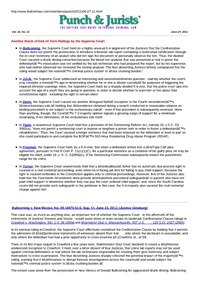Loaded on
June 27, 2011
published in Punch and Jurists
June 27, 2011
Here a unanimous Court held that a “deadbeat” father has no automatic due process right to counsel in a civil contempt proceeding, even when facing jail time; but 5 Justices said he may have a 14th Amendment right to “substitute procedural safeguards”.
In a series of decisions starting …
Loaded on
June 27, 2011
published in Punch and Jurists
June 27, 2011
Because it was generally recognized that custodial police interrogations entail “inherently compelling pressures,” the Supreme Court, in Miranda v. Arizona, 541 U.S. 652 (2004), adopted a set of prophylactic measures designed to safeguard the constitutional guarantee against self-incrimination. In effect, the Miranda Court held that, prior to commencing any …
Loaded on
June 27, 2011
published in Punch and Jurists
June 27, 2011
The opening paragraph of Justice Alito’s 7-2 majority opinion in this case described, in deceptively mellow words, the issue before the Court and the Court’s ruling as follows:
“The Fourth Amendment protects the right to be free from ‘unreasonable searches and seizures,’ but it is silent about how this …
Loaded on
June 27, 2011
published in Punch and Jurists
June 27, 2011
This case was, as much as anything else, an important test of whether the Supreme Court - in the aftermath of the retirements of Justices Stevens and Souter - would water down or even revoke its landmark Confrontation Clause rulings in Crawford v. Washington, 541 U.S. 36 (2004) and …
Loaded on
June 27, 2011
published in Punch and Jurists
June 27, 2011
This case involves the interrelationship between two different provisions of Federal Sentencing Law - namely Rule 11(c)(1)(C) of the Fed.R.Crim.P. and 18 U.S.C. § 3582(c)(2).
Rule 11(c)(1)(C) is the provision that authorizes a defendant to enter into a Type C plea agreement, which permits the parties to “agree that …
Loaded on
June 27, 2011
published in Punch and Jurists
June 27, 2011
Here a unanimous Supreme Court held that a provision of the Sentencing Reform Act, namely 18 U.S.C. § 3582(a), "does not permit a sentencing court to impose or lengthen a prison term in order to foster a defendant’s rehabilitation".
The relatively straightforward issue before the Court in this …
